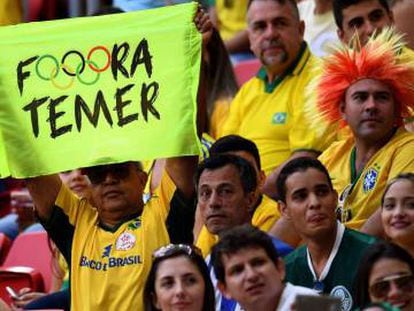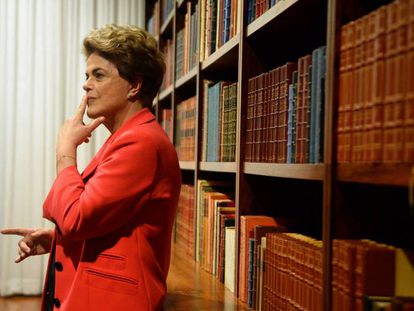Dilma Rousseff: “I am not fighting for myself, I am fighting for democracy”
Brazil’s suspended president delivers impassioned speech as she defends herself at the impeachment trial against her


After pulling some documents out of her purse, inside a packed room, where the audience shared a sense of history being made, Dilma Rousseff had a cup of coffee.
The suspended president of the Republic of Brazil was getting ready to defend herself in the political trial that will, in all likelihood, remove her from office.
After finishing her coffee, Rousseff took the stand to deliver the most important speech of her political career, and perhaps also her last. In a clear yet nervous voice, Rousseff, of the Workers’ Party (PT), said: “I am not fighting for my term in office, nor out of vanity or for power’s sake. I am fighting for democracy.”
Curiously, I am being judged for crimes I did not commit while Cunha is still not facing any pending trial. A historical irony? No, a deliberate action
Moments before her speech on Monday, a complete silence fell over the room – an uncommon occurrence in such a noisy nation as Brazil. The Supreme Court’s Chief Justice Ricardo Lewandowski, who was presiding the session, had issued a warning: “This is a trial, not a debate: I will allow no clapping, no booing, no placards and no laughter.”
For 14 hours, facing the 81 senators who make up the grand jury that will decide whether she stays or goes, Rousseff gave a tough and moving speech that appealed to listeners’ feelings and touched on her own political background, character and career to make the case that she is being unfairly thrown out of office.
She recalled, as she often has in the past (especially during campaign runs), how she was arrested in 1971 by the dictatorship while still a 20-year-old revolutionary, and sentenced without motive in her first trial ever. There is a famous photograph that captured the moment when a young Rousseff is seen staring at military judges who are covering their faces so as not to be recognized.
“There is no torture now, but I also look straight in the eyes of the people who are judging me,” she said. “And we will all be judged by history. This is the second time in my life that democracy is placed on trial along with myself.”
Sign up for our newsletter
EL PAÍS English Edition has launched a weekly newsletter. Sign up today to receive a selection of our best stories in your inbox every Saturday morning. For full details about how to subscribe, click here.
Later she assured that she respects the senators who will vote against her, thanked those who will vote in her favor, and addressed the still undecided: “Notice the precedent that is being created. Don’t believe the claim that if I go, the crisis will improve, because it will be the other way around.”
But the fact is, there are very few undecided senators. The vast majority have already manifested that they will vote to have Rousseff ousted. Some forecasts are talking about nearly 60 votes against her, although 54 will be enough.
The suspended president knows it, and is aware that only a miracle can save her at this point. That is why her speech was aimed not merely at the senators, but at the entire country, at the history books, at her own portrait and biography.
Rousseff reiterated that the crimes she is being accused of – using loans and funds from public banks to balance the federal budget and greenlighting certain outlays without congressional permission – are not really crimes but excuses to push her out of office. In short, her impeachment is based on political motives, not technical or legal ones.
“It is not legitimate to oust a president over her work. Only the people with their votes can do that,” she said. Then, Rousseff suggested that there are specific interests behind the efforts to get her out: “The conservative elites wanted power at any price.”
Mistakes: yes. Cowardice: no
Her voice cracked at times with the tension of the moment. But a glass of water and some timid applause (swiftly silenced by Lewandowski) were enough to get her going again with no further interruption. Rousseff admitted to making mistakes: during her second term in office the economic crisis ballooned, sending the country into the biggest recession of the last 80 years.
But then she added that her mistakes “do not include cowardice.”
“I never yielded and I never switched allegiances,” she said, in a reference to senators who used to support her but will now vote against her, such as Cristovam Buarque, once a member of the PT and now a supporter of impeachment.
Rousseff also underscored that she has not actually been accused of taking a single penny to enrich herself or her family. And that the man who triggered this entire process against her, former House speaker Eduardo Cunha, has been charged by prosecutors of taking bribes in connection with the Petrobras scandal and stashing his millions in foreign accounts.
“Curiously, I am being judged for crimes I did not commit while Cunha is still not facing any pending trial. A historical irony? No, a deliberate action,” she said, suggesting that it amounts to a coup.
Rousseff was suspended from office on May 12, when 55 senators voted in her favor and 22 against. Her deputy, Michel Temer, became the interim president.
When Rousseff ended the first part of her speech, and despite the chief justice’s instructions, part of the room broke out in applause. Some of the people giving her a standing ovation included former President Lula da Silva and the singer-songwriter Chico Buarque.
Later came the questions from senators, which the suspended president answered one by one. By then, she had already achieved the sad goal of her own defense: to leave historians with a beautiful, if useless, last speech.
English version by Susana Urra.












































